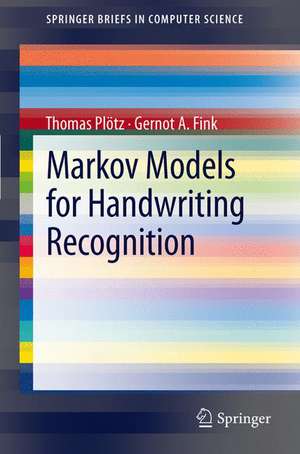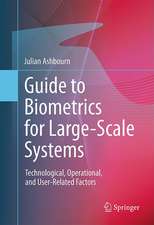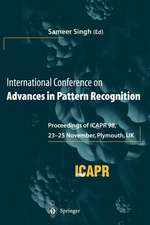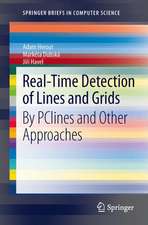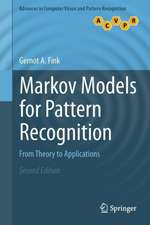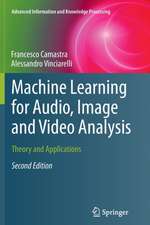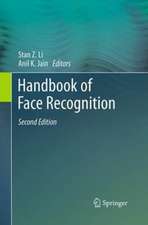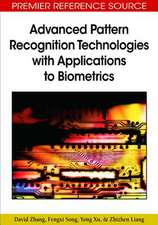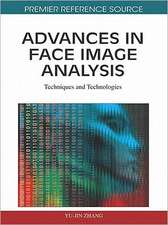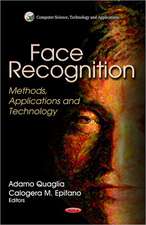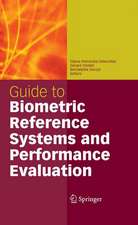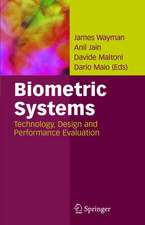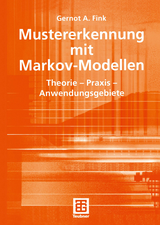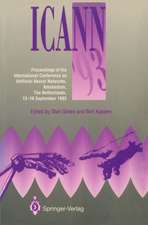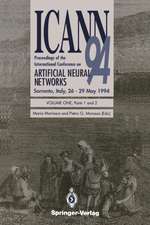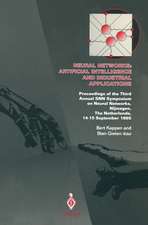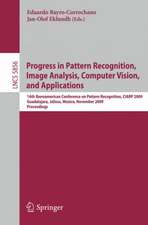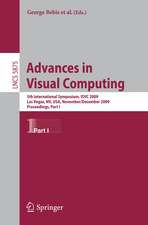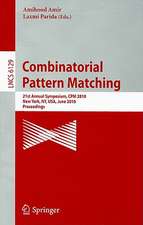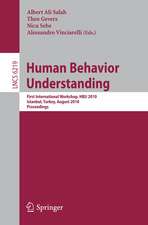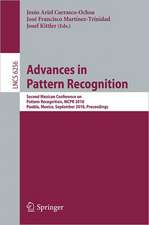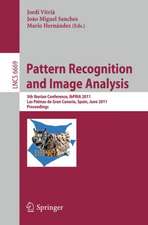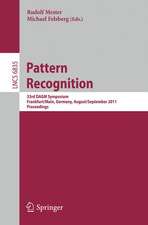Markov Models for Handwriting Recognition: SpringerBriefs in Computer Science
Autor Thomas Plötz, Gernot A. Finken Limba Engleză Paperback – 10 sep 2011
Din seria SpringerBriefs in Computer Science
-
 Preț: 475.83 lei
Preț: 475.83 lei - 20%
 Preț: 166.97 lei
Preț: 166.97 lei - 20%
 Preț: 325.63 lei
Preț: 325.63 lei - 20%
 Preț: 349.15 lei
Preț: 349.15 lei - 20%
 Preț: 302.49 lei
Preț: 302.49 lei -
 Preț: 381.81 lei
Preț: 381.81 lei -
 Preț: 446.47 lei
Preț: 446.47 lei - 20%
 Preț: 296.17 lei
Preț: 296.17 lei - 20%
 Preț: 335.66 lei
Preț: 335.66 lei - 20%
 Preț: 463.83 lei
Preț: 463.83 lei - 20%
 Preț: 323.00 lei
Preț: 323.00 lei - 20%
 Preț: 322.35 lei
Preț: 322.35 lei - 20%
 Preț: 321.85 lei
Preț: 321.85 lei - 20%
 Preț: 232.68 lei
Preț: 232.68 lei -
 Preț: 375.45 lei
Preț: 375.45 lei - 20%
 Preț: 323.00 lei
Preț: 323.00 lei - 20%
 Preț: 322.81 lei
Preț: 322.81 lei - 20%
 Preț: 324.17 lei
Preț: 324.17 lei - 20%
 Preț: 323.00 lei
Preț: 323.00 lei - 20%
 Preț: 322.17 lei
Preț: 322.17 lei - 20%
 Preț: 322.50 lei
Preț: 322.50 lei - 20%
 Preț: 323.34 lei
Preț: 323.34 lei - 20%
 Preț: 324.17 lei
Preț: 324.17 lei - 20%
 Preț: 323.46 lei
Preț: 323.46 lei - 20%
 Preț: 322.17 lei
Preț: 322.17 lei - 20%
 Preț: 322.02 lei
Preț: 322.02 lei -
 Preț: 341.50 lei
Preț: 341.50 lei - 20%
 Preț: 324.49 lei
Preț: 324.49 lei -
 Preț: 344.47 lei
Preț: 344.47 lei -
 Preț: 376.80 lei
Preț: 376.80 lei -
 Preț: 377.18 lei
Preț: 377.18 lei - 20%
 Preț: 324.17 lei
Preț: 324.17 lei - 20%
 Preț: 352.26 lei
Preț: 352.26 lei - 20%
 Preț: 321.32 lei
Preț: 321.32 lei - 20%
 Preț: 322.17 lei
Preț: 322.17 lei - 20%
 Preț: 324.17 lei
Preț: 324.17 lei - 20%
 Preț: 322.02 lei
Preț: 322.02 lei -
 Preț: 374.46 lei
Preț: 374.46 lei - 20%
 Preț: 320.21 lei
Preț: 320.21 lei - 20%
 Preț: 323.34 lei
Preț: 323.34 lei - 20%
 Preț: 324.17 lei
Preț: 324.17 lei - 20%
 Preț: 231.84 lei
Preț: 231.84 lei - 20%
 Preț: 294.97 lei
Preț: 294.97 lei - 20%
 Preț: 322.50 lei
Preț: 322.50 lei - 20%
 Preț: 323.46 lei
Preț: 323.46 lei -
 Preț: 374.08 lei
Preț: 374.08 lei -
 Preț: 408.23 lei
Preț: 408.23 lei - 20%
 Preț: 321.52 lei
Preț: 321.52 lei - 20%
 Preț: 323.34 lei
Preț: 323.34 lei - 20%
 Preț: 323.00 lei
Preț: 323.00 lei
Preț: 322.17 lei
Preț vechi: 402.72 lei
-20% Nou
Puncte Express: 483
Preț estimativ în valută:
61.67€ • 67.01$ • 51.83£
61.67€ • 67.01$ • 51.83£
Carte tipărită la comandă
Livrare economică 21 aprilie-05 mai
Preluare comenzi: 021 569.72.76
Specificații
ISBN-13: 9781447121879
ISBN-10: 1447121872
Pagini: 84
Ilustrații: VI, 78 p. 5 illus.
Dimensiuni: 155 x 235 x 13 mm
Greutate: 0.14 kg
Ediția:2011
Editura: SPRINGER LONDON
Colecția Springer
Seria SpringerBriefs in Computer Science
Locul publicării:London, United Kingdom
ISBN-10: 1447121872
Pagini: 84
Ilustrații: VI, 78 p. 5 illus.
Dimensiuni: 155 x 235 x 13 mm
Greutate: 0.14 kg
Ediția:2011
Editura: SPRINGER LONDON
Colecția Springer
Seria SpringerBriefs in Computer Science
Locul publicării:London, United Kingdom
Public țintă
ResearchCuprins
Introduction.- General Architecture.- Markov Model Concepts: The Essence.- Markov Model Based Handwriting Recognition.- Recognition Systems for Practical Applications.- Discussion.
Recenzii
From the reviews:
“The book provides a general introduction with 75 pages for researchers on handwriting recognition. More contents focus on the handwriting recognition methods based on Markov models, including a recognition framework and techniques within this framework. … this book gives an introduction for researchers on handwriting recognition. I think readers can get some useful information from it.” (Longlong Ma, IAPR Newsletter, Vol. 35 (2), April, 2013)
“The book provides a general introduction with 75 pages for researchers on handwriting recognition. More contents focus on the handwriting recognition methods based on Markov models, including a recognition framework and techniques within this framework. … this book gives an introduction for researchers on handwriting recognition. I think readers can get some useful information from it.” (Longlong Ma, IAPR Newsletter, Vol. 35 (2), April, 2013)
Textul de pe ultima copertă
Since their first inception more than half a century ago, automatic reading systems have evolved substantially, thereby showing impressive performance on machine-printed text. The recognition of handwriting can, however, still be considered an open research problem due to its substantial variation in appearance. With the introduction of Markovian models to the field, a promising modeling and recognition paradigm was established for automatic handwriting recognition. However, so far, no standard procedures for building Markov-model-based recognizers could be established though trends toward unified approaches can be identified.
Markov Models for Handwriting Recognition provides a comprehensive overview of the application of Markov models in the research field of handwriting recognition, covering both the widely used hidden Markov models and the less complex Markov-chain or n-gram models. First, the text introduces the typical architecture of a Markov model-based handwriting recognition system, and familiarizes the reader with the essential theoretical concepts behind Markovian models. Then, the text gives a thorough review of the solutions proposed in the literature for open problems in applying Markov model-based approaches to automatic handwriting recognition.
Markov Models for Handwriting Recognition provides a comprehensive overview of the application of Markov models in the research field of handwriting recognition, covering both the widely used hidden Markov models and the less complex Markov-chain or n-gram models. First, the text introduces the typical architecture of a Markov model-based handwriting recognition system, and familiarizes the reader with the essential theoretical concepts behind Markovian models. Then, the text gives a thorough review of the solutions proposed in the literature for open problems in applying Markov model-based approaches to automatic handwriting recognition.
Caracteristici
Introduces the typical architecture of a Markov model-based handwriting recognition system Describes the essential theoretical concepts behind Markovian models Provides a thorough review of the solutions proposed in the literature for open problems in applying Markov model-based approaches to automatic handwriting recognition
